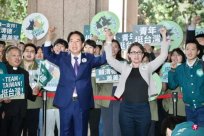The employment environment faced by Chinese college students is more difficult than in the past. The most important thing is to use policy resources, eliminate the employment barriers faced by college students, and give the lowest living security during the time of college students.
Researcher, China Youth Research Center, Jie Ying, at the fifth New Middle School forum organized by the Lianhe Morning Post on Tuesday (November 21), participated in the discussion session of the round table and made the above analysis.
The round table discussion session entitled "the troubles of the growth of new and middle -aged and middle -aged."Jie Jieying pointed out that the four major troubles currently faced by young people in China are academic heavy, difficulty in employment, difficulty in becoming a family, and raising children.
China's youth unemployment rate has risen monthly in the first six months of this year, and the official suspension of update in August has attracted attention.
Jie Jieying responded to questions about the employment pressure of college students in the Q & A session. At present, the employment environment of college students is much more difficult than in the 1970s and 1980s. Among them, it covers structural problems and there are problems that need to transform.
He believes that college students have to adapt to changes in the situation and the requirements of the employment market.On the other hand, more importantly, the national society must make more efforts to pave the way for college students to make a bridge.
Jie Jieying pointed out that the most important thing is to use policy resources.He suggested to eliminate the barriers and obstacles of employment, eliminate monopoly enterprises to employment threshold for civilian children, and give the lowest living security for college students.
He said: "Can't make college students hungry their stomachs to find a job, so the country must give funding support when they have low salary during their employment, when their salary is low, and when starting a business."
Guests participating in the round table forums in the same field, including Cai Ruilong, the senior government affairs director of the Ministry of Culture, Community and Youth, and Social and Family Development, Zhuo Liva, Director of Shuangli International, Su Huilan, Dean of the Nanyang Academy of Arts in Singapore, and the whole country of SingaporeDavid Cai, president of the youth council, and Peng Fei, a doctoral student in Communication University of China.
Zhuo Liva pointed out that the communication between young people and parents in this era has appeared in a gap.
She took her friends around her as an example. Some parents believed that they had paved their way for their children and provided the best education, houses, and guarantees.But they couldn't feel the worry of their children, and even felt that the child was moaning a bit without illness, which caused many young people to feel the warmth of the family at home and refused to communicate with their parents.
Zhuo Liva reminded that when the younger generation explores inwardly, when I explore where I should go, family and society should give the leadership of power.At the social level, schools, media, and governments should provide some channels as much as possible for young people to make society better understand them.
She said, "I think when they are recognized and praised by society and family, they are confident to stand up. There is a saying that it is particularly good. Rather than helping him to pave the way, it is better to let him learn to goGood way.
Cai Ruilong believes that young people are most concerned about the problem of existence, especially young people with low -income families. They may question whether they are expected to get rid of poverty, or this is just the case.
Cai Ruilong reminded that if more and more youth response to life is "I am just like this", the social alarm needs to sound.
Cai Ruilong pointed out that Singapore is committed to helping low -income families flow upward, thereby promoting the liquidity of the overall society. "This is a key long -term result that the Singaporean government has always hoped to achieve with various organizations and groups in society."




